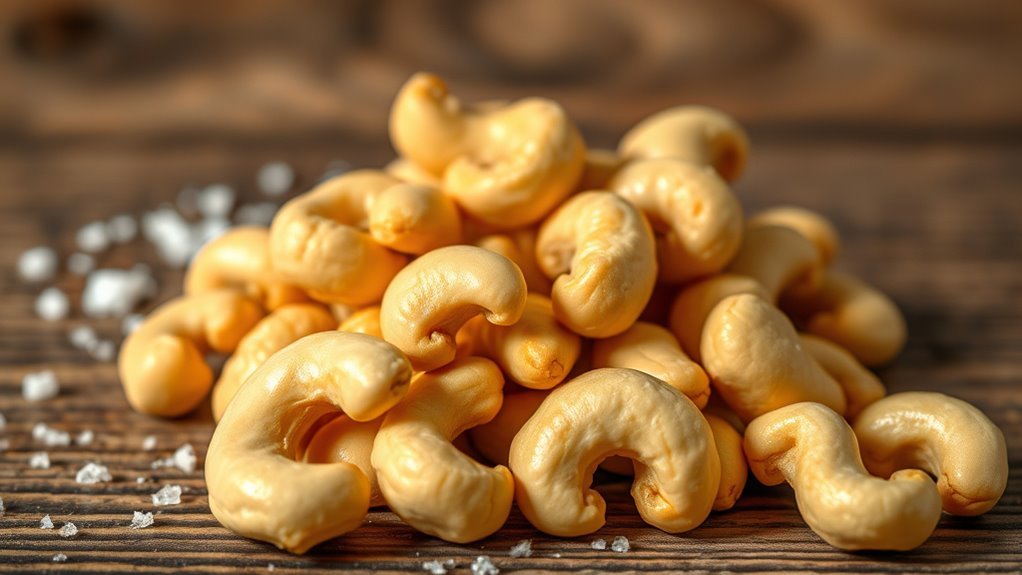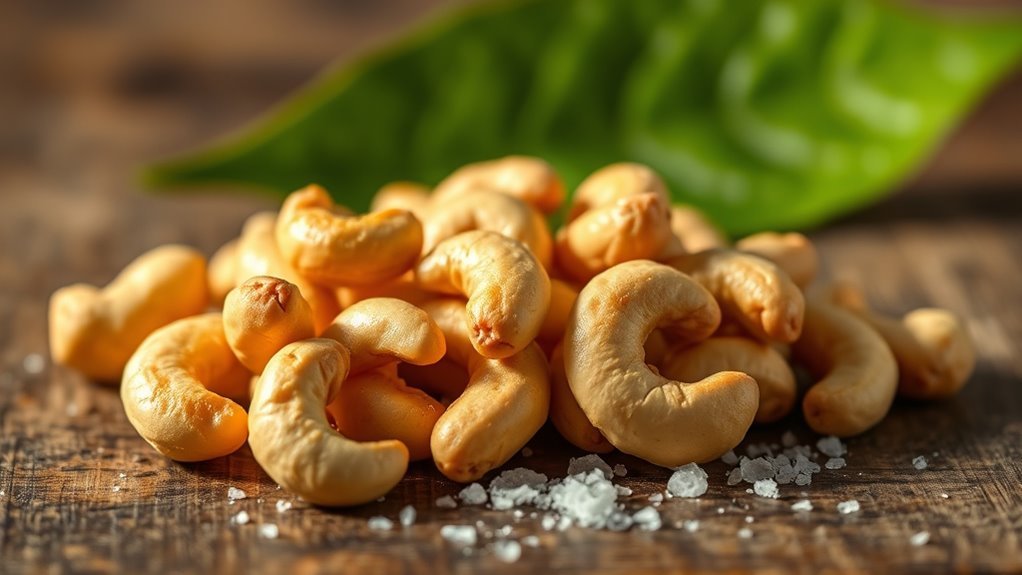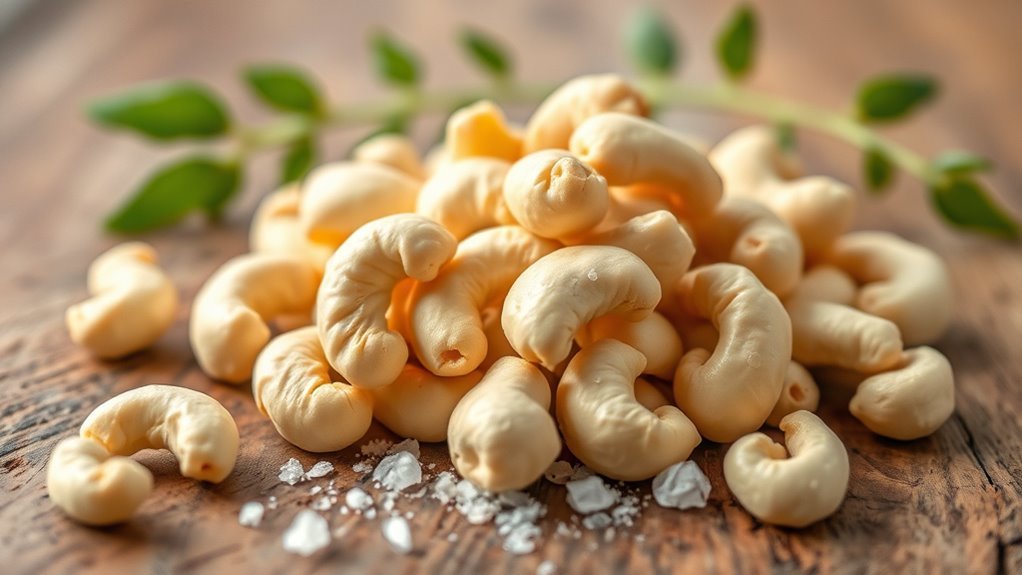Cashews aren’t considered keto-friendly due to their moderate carbohydrate content, containing about 30 grams of carbs per 100 grams. This amount can hinder your ability to maintain ketosis, especially compared to lower-carb nuts like almonds and pecans. While they offer health benefits, such as heart-healthy fats and essential minerals, portion control is vital. If you’re curious about healthier alternatives and tips for incorporating nuts into your diet, there’s more to explore.
Nutritional Profile of Cashews

When it comes to snacking, cashews offer a unique blend of nutrients that can be beneficial in a ketogenic diet. Their nutrient density is impressive, packed with healthy fats, protein, and essential vitamins and minerals. You’ll find that cashews contain magnesium, which plays a role in energy production and muscle function, alongside zinc and copper that support overall health. Additionally, they provide a good source of antioxidants, which can help combat oxidative stress. While they’re not the lowest in carbs among nuts, their healthy fat content can still fit into your keto lifestyle when consumed in moderation. Embracing cashew benefits can enhance your snacking experience while keeping you aligned with your nutritional goals.
Carb Count Comparison With Other Nuts

Although cashews are often enjoyed for their creamy texture and rich flavor, their carbohydrate content can raise questions for those following a ketogenic diet. With about 30 grams of carbs per 100 grams, cashews rank higher than many other nuts. For comparison, almonds contain around 10 grams of carbs, while walnuts and macadamia nuts have just 7 and 14 grams, respectively. If you’re keen on maintaining your carb count, these comparisons matter. Nuts like pecans and Brazil nuts are even lower, making them more suitable for a keto lifestyle. Ultimately, understanding these nut comparisons can help you make informed choices that align with your dietary goals, allowing you to enjoy your freedom while staying on track.
Health Benefits of Cashews

While cashews might not be the lowest-carb nut option, they still offer several health benefits that make them a worthy addition to your diet. One of the notable cashew benefits is their positive impact on heart health. They’re rich in monounsaturated fats, which can help lower bad cholesterol levels, reducing the risk of heart disease. Additionally, cashews are packed with essential minerals like magnesium and copper, supporting bone health and energy production. Their antioxidant properties combat oxidative stress, promoting overall wellness. Including a moderate amount of cashews in your diet can provide these health benefits while satisfying your cravings. So, if you’re looking for a nut that combines taste and nutrition, cashews might just be the perfect choice for you.
Portion Control and Serving Sizes
Enjoying the health benefits of cashews can be a delightful experience, but portion control is key to keeping your keto diet on track. The typical serving size for cashews is about one ounce, which translates to roughly 18 nuts. While they’re nutrient-rich, cashews are higher in carbs compared to other nuts, so it’s important to be mindful of how many you consume. Practicing mindful eating can help you savor each bite while managing your intake. This allows you to enjoy cashews without derailing your dietary goals. Remember, moderation is vital; incorporating small amounts can provide health benefits without exceeding your carb limits. Keeping track of your serving sizes will guarantee you maintain the balance needed for a successful keto lifestyle.
Incorporating Cashews Into a Keto Diet
When incorporating cashews into your keto diet, it’s essential to understand their nutritional profile, as well as how to manage your portion sizes effectively. You can explore various recipe ideas that highlight cashews while keeping your carb intake in check. By using some practical tips, you’ll be able to enjoy these nuts without derailing your ketogenic goals.
Nutritional Profile Analysis
Incorporating cashews into a keto diet can be a bit tricky, as their nutritional profile presents both advantages and challenges. While they offer some health benefits, it is crucial to know their nutrient density varies among cashew varieties. Here’s a quick comparison:
| Nutrient | Standard Cashews | Raw Cashews | Roasted Cashews |
|---|---|---|---|
| Calories (per oz) | 157 | 157 | 163 |
| Carbs (g) | 9 | 9 | 9 |
| Protein (g) | 5 | 5 | 5 |
Cashews are nutrient-dense, providing healthy fats and essential minerals. However, their higher carb content can challenge your keto goals, so consider portion sizes carefully.
Portion Control Strategies
To effectively include cashews in your keto diet without exceeding your carb limits, it’s essential to practice portion control. Start by measuring out portion sizes; a typical serving is about one ounce, which contains roughly 9 grams of carbs. This allows you to enjoy the nutty flavor without derailing your diet. Incorporating mindful eating techniques can further enhance your experience. Take the time to savor each bite, which can help you feel satisfied with smaller amounts. You might also consider pairing cashews with lower-carb foods, like cheese or celery, to create a balanced snack. Being conscious of your intake not only helps maintain your carb count but also promotes a healthier relationship with food, granting you the freedom to enjoy treats in moderation.
Recipe Ideas and Tips
While cashews can fit into a keto diet, finding creative ways to use them can enhance your meals without compromising your carb goals. Consider making homemade cashew snacks, like roasted cashews with your favorite spices, to satisfy cravings without the guilt. You can also blend soaked cashews into a creamy base for keto desserts, such as cheesecake or chocolate mousse. Another idea is to incorporate cashews into salads or stir-fries for added crunch and flavor. Just remember to watch your portions, as they can add up quickly. With these simple tips, you can enjoy the benefits of cashews while staying true to your keto lifestyle. Your taste buds and body will thank you!
Alternatives to Cashews for Keto
If you’re looking for alternatives to cashews on a keto diet, there are plenty of low-carb nut options to contemplate, such as macadamia nuts and pecans. Additionally, seeds like chia and flax are excellent substitutes that provide healthy fats without the carbs. Exploring these alternatives can help you maintain your keto goals while enjoying diverse flavors and textures.
Low-Carb Nut Options
Although cashews are a popular choice among nut lovers, they aren’t the best fit for a ketogenic diet due to their higher carbohydrate content. If you’re looking for low-carb nut options, consider almonds, pecans, or macadamia nuts. These nut varieties offer a great source of healthy fats while keeping your carb intake low. For instance, almonds contain just 2.9 grams of net carbs per ounce, making them a fantastic low-carb snack. Pecans are even lower, with only 1.2 grams of net carbs per ounce. Macadamia nuts are also a great choice, with a mere 1.5 grams per ounce. Exploring these alternatives can help you enjoy your snacks while staying true to your keto goals, giving you the freedom to savor every bite.
Seed Alternatives for Keto
When you’re on a ketogenic diet and looking for alternatives to cashews, seeds can be an excellent option. Seeds such as chia, flax, and pumpkin are low in carbs while providing healthy fats and protein. In your seed selection, consider their unique nutritional profiles; for instance, chia seeds are high in omega-3 fatty acids, which can support heart health. You can also experiment with various seed recipes, like adding pumpkin seeds to salads or making chia puddings for a satisfying snack. These alternatives not only keep your carb intake in check but also add diversity to your meals. Embracing seeds allows you the freedom to explore new flavors while sticking to your keto goals.
Potential Drawbacks of Cashew Consumption
While cashews are often celebrated for their nutritional benefits, there are potential drawbacks to reflect upon. Here are some concerns to take into account:
- Cashew allergies: Some individuals may experience allergic reactions, which can be severe.
- High oxalate content: Cashews contain oxalates, which can contribute to kidney stone formation in susceptible individuals.
- Caloric density: They’re calorie-rich, making portion control essential for those managing weight.
- Carbohydrate content: Cashews have a higher carbohydrate count compared to other nuts, which might not align with strict keto guidelines.
- Additives: Many commercially available cashews are salted or flavored, potentially impacting their healthfulness.
Being informed about these aspects can help you make better dietary choices regarding cashew consumption.
Tips for Choosing Quality Cashews
Choosing quality cashews can greatly enhance your snacking experience and nutritional intake. When selecting cashews, look for those with quality sourcing and consider organic options for fewer pesticides. If you prefer roasted varieties, check for minimal added oils and seasonings to maintain their health benefits. Raw selections often provide the most nutrients, so weigh your options based on flavor profiles and personal preference. Always examine nutrition labels for calorie content and allergen considerations, especially if you have sensitivities. Support brands with strong sustainability practices, ensuring your snack not only tastes good but is also good for the planet. By making informed choices, you can enjoy cashews as a delicious and health-conscious addition to your diet.
Frequently Asked Questions about Cashews and Keto Diet
1. Are cashews low in carbs, making them suitable for a keto diet?
Cashews are relatively higher in carbohydrates compared to other nuts. A 1-ounce serving of cashews contains about 9 grams of carbs, which may not fit into the strict carb limits of a ketogenic diet. While they do provide healthy fats and protein, if you’re following a very low-carb keto diet, you might want to limit your intake of cashews or opt for lower-carb nuts like macadamias or pecans.
2. What are the nutritional benefits of cashews?
Cashews are packed with important nutrients. They contain healthy monounsaturated fats, protein, vitamins (like E and K), and minerals such as magnesium, copper, and zinc. These nutrients can support heart health, improve bone density, and boost the immune system. However, it’s essential to consume them in moderation due to their carb content when on a keto diet.
3. Can I include cashews in my keto diet in moderation?
Yes, you can include cashews in moderation on a ketogenic diet. If you monitor your overall carbohydrate intake and ensure it stays within your daily limit, you can enjoy a small portion of cashews occasionally. It’s crucial to balance your overall nutrition and consider other low-carb foods to maintain ketosis while enjoying the taste of cashews.
4. What is the best way to incorporate cashews into a keto-friendly diet?
To incorporate cashews into a keto-friendly diet, consider using them as a topping for salads or stir-fries, blending them into smoothies for creaminess, or using cashew butter in small amounts. Always measure your portions to keep track of your carb intake. Additionally, combining cashews with high-fat foods like cheese or avocado can help balance their carb content.
5. Are there any alternatives to cashews for a keto diet?
Yes, there are several low-carb nut alternatives that are more suitable for a ketogenic diet. Macadamia nuts, pecans, and Brazil nuts are excellent choices as they contain fewer carbs and higher fat content. Seeds like chia seeds, flaxseeds, and pumpkin seeds can also be great alternatives, providing healthy fats and fiber without excessive carbs.
References
- https://www.ncbi.nlm.nih.gov/pmc/articles/PMC6723440/
- https://www.healthline.com/nutrition/are-cashews-keto
- https://www.medicalnewstoday.com/articles/325343
- https://www.thekitchn.com/are-cashews-keto-22910783
- https://www.webmd.com/diet/obesity/what-is-the-ketogenic-diet
- https://www.nutrition.gov/topics/whats-in-food/nutritional-information-cashews
- https://www.verywellfit.com/are-cashews-keto-friendly-5197031


